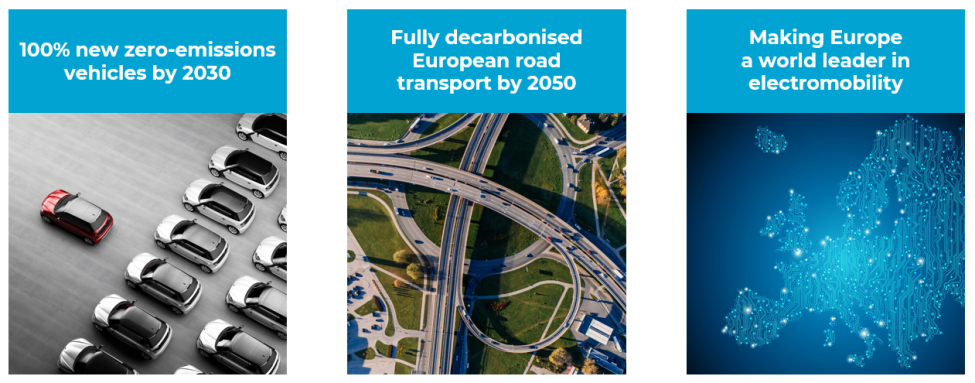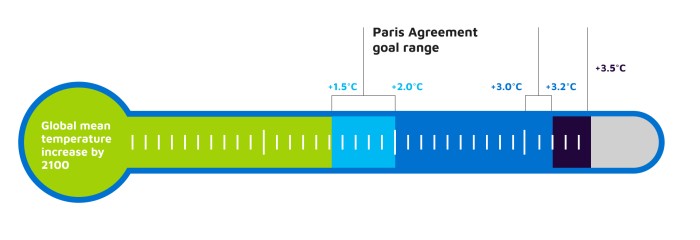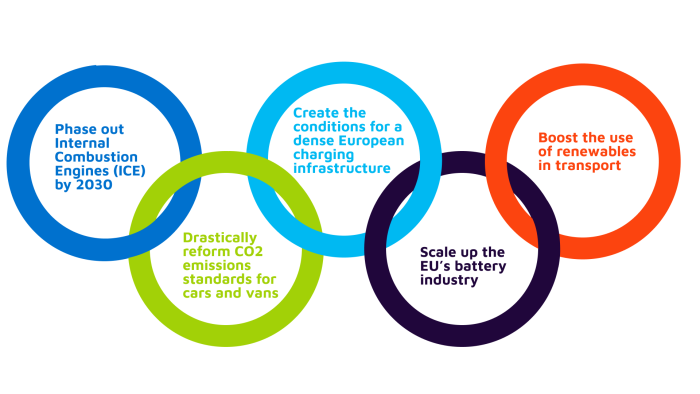



Close to 3 million fully electric vehicles currently on European roads. EV sales share increased close to four times between 2019 and 2021. European policies and the EU’s Green Deal offer unique opportunities to further scale up electromobility in coming years.

We must support and accelerate the transition to zero emission mobility.
Electric vehicles have 3 times lower GHG footprint than Internal Combustion Engine vehicles under the current energy mix.
Reaching the COP21 goal of limiting temperature to 1.5°C will require a complete decarbonisation of the transport sector by 2050.
Electric vehicles do not produce any tailpipe pollutants such as NOx and fine particles (PM10 and PM2.5).
More models are coming to the market in larger quantities while price per unit keeps reducing steadily.
An electric vehicle is silent at city speeds and during acceleration.
Electromobility is a global growth market, and Europe cannot afford to lag behind.

We must strengthen CO2 reduction targets for cars and vans and include an ICE phase-out date by 2030 to help increase the uptake of zero emission mobility.
The revision of the Regulation setting CO2 emission standards for cars and vans must therefore:
In 2022, the ambition for light duty vehicles needs to be matched for heavy duty vehicles through strict CO2 standards.
Furthermore, the revised Euro 7 Emissions standards should support the planned phaseout trajectory for both HDVs and LDVs, while ensuring clean and healthy cities for all EU citizens.
--------
The charging environment across Europe must be more consumer-friendly, seamless, interoperable, and suitable to heavy-duty vehicles.
AVERE therefore welcomes the proposed Alternative Fuels Infrastructure Regulation (AFIR):
We will continue to engage on details of the regulation to minimise regulatory burden on charging industry and to improve user experience.
We will also continue to constructively engage on the proposed revision of the Energy Performance of Buildings Directive (EPBD) to guarantee charging where is most convenient for users.
--------
In order to fully reap the benefits of electromobility, legislation should support the rapid uptake of renewable energy, as well as of smart charging and vehicle to grid technology.
The revision of the Renewable Energy Directive is a significant opportunity:
We must also swiftly enhance Energy System Integration, specifically through the development of smart charging and vehicle to grid technology. EU power markets should permit EVs, as a decentralised energy resource, to provide flexibility services.
--------
As EV sales begin to take off in Europe, the EU’s ability to remain competitive with the rest of the world will be heavily dependent on domestically developing batteries at a larger scale.
AVERE welcomes the European Commission’s Battery Regulation proposal from December 2020. The new regulation should:
AVERE also supports the introduction of rules for the responsible sourcing of raw materials for batteries.
--------
EU regulation needs to be consistent and holistic, taking into account the various business models already established on the market. It should stimulate the development and uptake of innovative technologies, while keeping consumer interests at heart.
